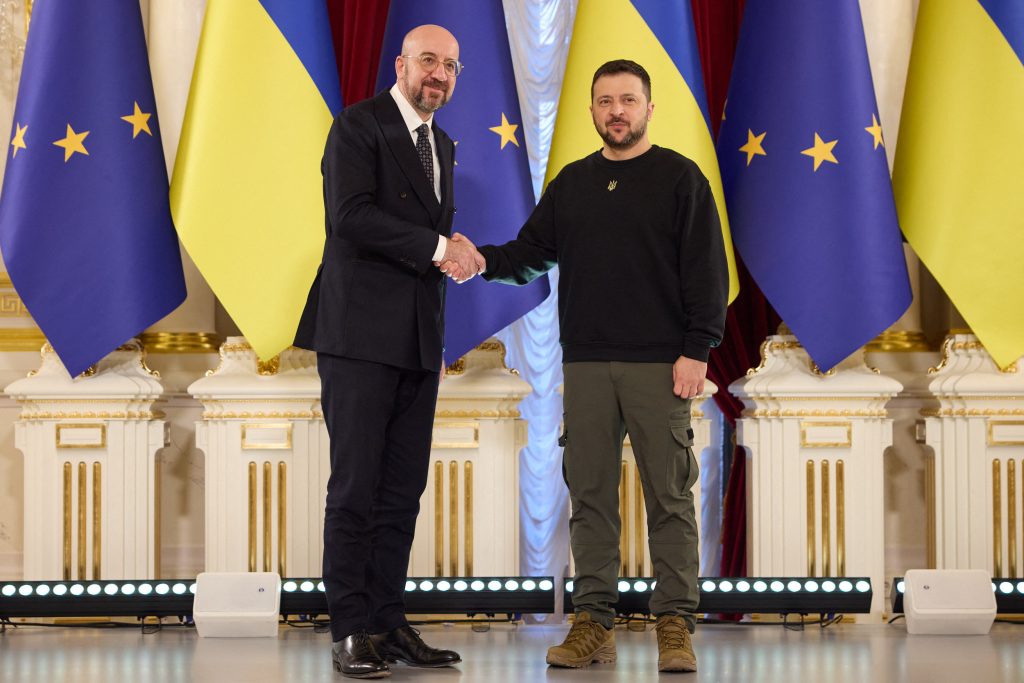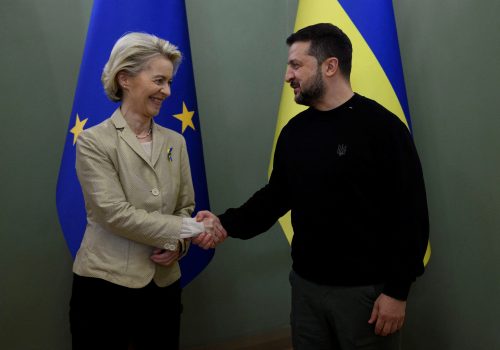Ukraine in the EU would be a game-changer for Europe’s decarbonization drive
When the European Council meets in the coming days, it will consider whether to open accession negotiations with Ukraine to join the European Union (EU). This milestone moment comes at the recommendation last month of the European Commission, which recognized the major reforms that Ukraine had undertaken toward membership so far. While no timeline is set yet on how long these negotiations should remain open, it stands in contrast to an earlier and more hesitant approach the EU had shown toward Ukraine’s membership bid. Only last year, French officials poured cold water on any Ukrainian hopes to join the EU soon, asserting that it would take at least fifteen to twenty years, and perhaps more.
A lot has changed for the EU’s decarbonization and economic policy since. Europe’s geopolitical situation, already upended by Russia’s invasion of Ukraine, was followed in August 2022 by the US Inflation Reduction Act, one of the world’s largest green domestic spending plans, which dramatically altered the seventy-year-old Washington consensus orientation toward free trade. Consequently, the prospect of a bigger, stronger Europe, better able to meet external shocks and threats, is proving more appealing than ever in Paris and Berlin, which was a factor in the European Commission’s proposal for the Net-Zero Industry Act, which aims to bolster Europe’s manufacturing capacity of net-zero technologies.
Ukraine joining the EU could be a game changer for Europe’s decarbonization drive because its accession would be directly tied to EU transitional and renewable energy investment activities under the European Green Deal, which outlines plans for the EU to reduce its carbon emissions by 55 percent by 2030, and the REPowerEU plan, which aims to accelerate the clean energy transition. However, both decarbonization and enlargement face significant but linked challenges in reforming EU internal decision-making processes to implement the Green Deal and REPowerEU Plan’s objectives while permitting Ukraine to join the EU. By streamlining its decision-making process, the EU would expedite Ukraine’s EU accession path, enabling significant clean energy imports from Ukraine in the near term.
At a decarbonization crossroad
Russia’s invasion of Ukraine put Europe’s various hydrocarbon-linked vulnerabilities on display. However, instead of remaining susceptible to Russia’s attempts at energy-based extortion, Europe accelerated its drive to decarbonize and de-risk its global supply chains, especially under the REPowerEU plan.
On decarbonization grounds, integrating Ukraine should be a no-brainer for Brussels. Before the war, Ukraine was a primary exporter of iron and steel, key components of the drive to decarbonization due to their role in solar and wind farm construction. Ukrainian steel exports alone totaled more than twenty million tons in 2021. Ukraine and Europe would both clearly benefit from “greening” the reconstruction of its iron and steel industries by drawing on EU advances in decarbonizing these sectors. Ukraine also has significant expertise in nuclear energy; holds vast potential in solar, wind, and hydropower production; and has vast deposits of lithium, a critical material on Brussels’ wish list for the production of clean energy technologies.
In fact, Ukraine is already proving to be a sort of live experiment on decarbonization: It is rebuilding vital infrastructure that is decarbonized, in a context where Ukrainians need access to energy and transport infrastructure, no matter its color, green or otherwise. European policymakers also need to address decades of their own underinvestment in infrastructure while tending to the growing needs of their vulnerable populations. As Ukraine develops its own green infrastructure plan, the EU is struggling to come up with a satisfactory one of its own beyond the REPowerEU Plan.
Rebranding Ukraine’s integration into the EU
Ukraine will need to pursue ambitious reforms if it is to meet the exacting standards that EU integration requires. But reforms need to take place in Brussels as well. Regardless of Ukraine’s enthusiasm for joining the EU, at least two problems need to be fixed to ensure a successful integration of EU candidate states: funding and decision making. According to an internal EU study, “many” existing EU countries would have to become net contributors to the EU budget to assist with Ukraine’s integration and economic development, especially to align Ukraine’s agricultural and cohesion policies to the EU’s. Compounding these issues further, EU policymaking is already prone to endless negotiations, as many decisions require unanimous agreement among all member states. The good news is, should EU policymakers solve these institutional issues, they could go a long way toward helping the EU meet its decarbonization goals. In their campaign to accelerate Ukraine’s EU accession, European policymakers should stress the environmental co-benefits, as it were, of reforming European institutions.
Indeed, a major problem with EU enlargement is reforming that decision-making process. EU policymaking negotiations are already notoriously long and complex, with numerous holdups due to unanimity requirements on key portfolios, including foreign policy, enlargement, taxation, and EU-level financing. This makes the EU a truly collective undertaking, requiring painstaking consensus building. But in the case of enlargement and the fight against climate change, Europe does not have the luxury of waiting for recalcitrant members to fall in line—whether it is Poland doubling down on coal, Hungary whittling down the rule of law, or France refusing to build gas interconnectors between Germany and Spain. Accepting new members such as Ukraine into the EU will necessarily mean reforming the way decisions are made. New rules should be crafted to ensure they enable the acceleration of decarbonization, and not the reverse. A recent proposal from a Franco-German intergovernmental working group to expand qualified majority voting and withhold funding in case of rule of law violations is a good one, but this should also extend to matters related to European decarbonization objectives, enshrined in REPowerEU and the Fit for 55 legislative package to implement the European Green Deal’s policies. For example, extra EU funding could be conditioned on climate action under the purview of REPowerEU and Fit for 55.
The Kremlin thought it could divide the EU internally with its attempts at energy extortion during its invasion of Ukraine. Instead, it may have incentivized the EU to strengthen both its decarbonization efforts and its institutions. The EU should commit to not only the decarbonization standards that it has set for Ukraine’s accession bid, but also take inspiration from Ukraine’s own green reconstruction plans. Europe’s urgent decarbonization must be linked to security and overall institutional reforms within the greater European integration project. Accomplishing both will require deep reforms—both in Ukraine itself and in the EU.
Théophile Pouget-Abadie is a nonresident fellow with the Atlantic Council’s Europe Center and a policy fellow with the Jain Family Institute, focusing on decarbonization, the energy transition, and European policy.
Francis Shin is a research assistant in the Atlantic Council’s Europe Center.
Further reading
Fri, Dec 1, 2023
Don’t stop now. US aid to Ukraine continues to be a wise investment.
New Atlanticist By Michael John Williams
Cutting off aid to Ukraine now, as some in Congress propose, would undermine the immediate war effort in Europe and diminish the deterrent power of US military force globally.
Sat, Nov 25, 2023
Many Ukrainians see Putin’s invasion as a continuation of Stalin’s genocide
UkraineAlert By Kristina Hook
Many Ukrainians see today’s ongoing Russian invasion as a continuation of the Stalin regime’s genocidal attempts to eradicate Ukrainian national identity and destroy the Ukrainian nation, writes Kristina Hook .
Tue, Nov 21, 2023
Wartime Ukraine is making historic progress toward EU membership
UkraineAlert By Mark Temnycky
The Ukrainian authorities have made clear they view EU membership as a strategic priority and are fully committed to pursuing this goal, even while defending themselves against Russia’s ongoing invasion, writes Mark Temnycky.
Image: Ukrainian President Volodymyr Zelensky and European Council President Charles Michel shake hands in downtown Kyiv, amid the Russian invasion of Ukraine. The EU chief made an unannounced visit to the Ukrainian capital Kyiv on November 21, 2023, the tenth anniversary of the start of the pro-European Maidan protest movement. Photo by Ukrainian Presidency via ABACAPRESS.COM





